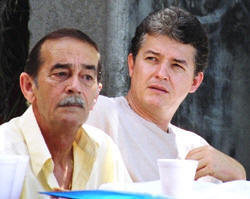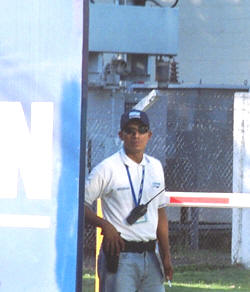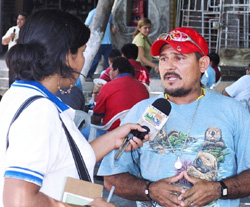|
El Salvador
|
|
Calvo Brazil union leaders visit Salvadorian trade union
“The situation
is much worse than we thought”
Jotacy Leite, president of the Union of Fishing Industry
Workers of Itajaí (SITIPI), and Oswaldo Mafra, president of
the Union of Food Industry Workers of Itajaí (SITIAI), both
unions from the Brazilian state of Santa Catarina and
members of Brazil’s National Confederation of Food Workers (CNTA)
and Labor Power Federation, arrived at El Salvador last
Sunday, June 17. SITIPI represents 1,800 workers of the
Gómez da Costa tuna plant, located in southern Brazil, in
which CALVO owns an 80 percent stake
|

Jotacy
Leite and
Oswaldo Mafra |
The purpose
of their visit was to share experiences with Salvadorian labor
organizations, including the General Union of Fishing and Related Industry
Workers (SGTIPAC), which represents CALVO workers in La Unión
and is affiliated to the trade union federation FESTSSABHRA, the
Labor Confederation of Salvadorian Workers (CSTS), and Rel-UITA.
Leite
and Mafra had first heard the complaints voiced by CALVO-La Unión
workers back in late January 2007.
These
reports surprised them, as ever since it purchased a majority stake at the
Gómez da Costa tuna plant in Santa Catarina in 2004, CALVO had
been engaged in collective bargaining without any problems, and the union
representatives described labor-management relations there as being
“cordial.”
Which is
why they wanted to know straight from the workers what the situation was
like in El Salvador. With that aim they met with SGTIPAC’s Governing
Committee, where they obtained a first-hand report on the antiunion layoffs,
and learned of the huge differences in working, contractual, and wage
conditions that exist in CALVO El Salvador and CALVO Brazil.
Although
CALVO El Salvador boasts that it pays its workers more than the minimum
wage, the slight difference it pays is only possible because it forces
workers to put in a very intense workday, and because -at least in the case
of the workers in the nightshift (for which Salvadorian legislation
establishes a 7-hour maximum)- it makes them work one hour more than what is
legally stipulated, and systematically requires them to do two to three
hours overtime. This means that the nightshift normally does 11-hour
workdays: from 6 in the evening to 5 a.m.
Double standards? … Me?
Other
issues discussed were fishing methods and sea resources in the Central
American Pacific Ocean. While tuna ships in Europe and Brazil
catch fish with hooks, in the coasts of El Salvador, where
this activity remains unregulated, the ships freely use large-sized nets,
which are known to produce a negative impact on marine life. That’s how
CALVO vessels are able to catch huge volumes of industrial tuna in a
relatively short time.
|
If he’s lucky, a CALVO stevedore at La Unión will make around 200 dollars a month working arduously with his crew, unloading some 4 thousand tons of tuna during the month. Oddly enough, a stevedore at the CALVO company in Santa Catarina, under an employment scheme regulated by SITIPI’s Collective Bargaining Agreement, can easily earn 3,500 to 4,000 dollars a month, plus labor and health benefits for himself and his family.
|
|
These ships are then unloaded at the Punta Gorda plant dock -known as “Puerto Corsain”- by local stevedores that the company CALVO CONSIGNATARIA hires on a piecework basis, paying them 0.05 dollars per ton of tuna unloaded. Once they finish unloading, CALVO forces them to sign a legal “discharge” –in exchange for their pay– whereby the workers release the company from any labor liability. As the Salvadorian saying goes: “If ever I see you again, I’ll have forgotten you”.
If he’s lucky, a CALVO stevedore at La Unión will make around 200 dollars a month working arduously with his crew, unloading some 4 thousand tons of tuna. Oddly enough, a stevedore at the CALVO company in Santa Catarina, Brazil, working under an employment scheme regulated by SITIPI’s Collective Bargaining Agreement, can easily earn 3,500 to 4,000 dollars a month, plus labor and health benefits for himself and his family.
A worker at the Gómez da Costa plant receives in average a monthly salary of about 600 dollars, also under a collective bargaining agreement that guarantees additional benefits for both her and her family. This same worker at CALVO El Salvador would have to work 9 to 10-hour days, meeting high production targets and under a climate of antiunion intimidation, in order to obtain a mere 200 dollars a month.
|

Armed guards hired by the CALVO Group |
During their
visit to the city of La Unión, the Brazilian unionists also had the opportunity
of organizing a “Civil Society Assembly,” gathering 70 representatives of
various civil and citizen organizations from the area. The assembly was
primarily composed of environmentalists, community leaders, municipal employees,
and health care workers. Everyone who spoke at the assembly agreed on the need
to urgently support SGTIPAC’s organizing efforts at CALVO, in the
interest of the community, the municipality, and the department of La Unión.
In the
afternoon of June 18, they attended a newsletter hand out activity at the
entrance of the factory, organized by CALVO unionists, with the support
of fellow activists from other unions. At the activity, which included
loudspeakers urging workers to overcome their fears and join the union, the
Brazilian unionists witnessed a typical example of CALVO’s antiunion
intimidation practices: the drivers of the buses filled with dayshift workers
leaving the factory were instructed by plant security to drive on past the union
picket line to prevent workers from receiving the newsletter. The activists had
to form a human fence to block the way in order to hand out the newsletter to
the workers. At the same time, as they crossed the company’s control point, the
buses bringing in the nightshift workers were being stopped by CALVO
armed guards backed by national police officers. The Brazilian unionists
watched in astonishment as CALVO’s armed guards climbed into the buses to snatch
from the workers’ hands the newsletters that the labor activists had just handed
out to them.
That night,
Mafra and Leite, along with a representative from the US labor
federation, AFL-CIO, were interviewed on a TV show aired live on La
Unión’s CHANNEL 9. During the one-hour program, they voiced their
concern, as representatives of international unions, over the events they had
witnessed at CALVO. The show’s open phone line received several calls
from local viewers who expressed the community’s alarm at the lack of union
freedom in the Spanish tuna company and at the various labor problems that occur
there daily.
In the
afternoon of June 9, the Brazilian unionists visited the “Bendición de Dios”
community, in the municipality of San Antonio Silva, La Unión, where many
CALVO workers live. There, far from the intimidation of the armed guards,
they had a chance to share their experiences and concerns with a group of
workers who learned of the benefits that unionism has brought to the working
class of the state of Santa Catarina, Brazil.
Legislators mark their disappointment with CALVO
After visiting
La Unión, the Brazilian unionists and their Salvadorian and
United States counterparts had a chance to discuss in detail the need for
firm action from the national and international labor movement to put an end to
CALVO’s double standards. As in previous occasions, CSTS and
FESTSSABHRA asked CALVO’s representative in El Salvador,
Miguel Angel Peñalva, to meet with the international delegation, but once
again received no answer.
|
As in previous occasions, CSTS and FESTSSABHRA asked CALVO’s representative in El Salvador, Miguel Angel Peñalva, to meet with the international delegation, but once again received no answer. |
|
However, the trade union delegation was able to meet with the Counsel for the Defense of Human Rights, where they received an overview of the labor problems at CALVO that have been monitored by this body since 2004. They also met with congresspersons form the Labor Committee of El Salvador’s Legislative Assembly, who acknowledged that they had listened to CALVO’s demands in 2006 when it protested that if El Salvador did not ratify the ILO conventions it would lose the tariff benefits granted by the EU. The legislators expressed their discontent at the fact that that very same company is now refusing to meet the labor obligations stipulated in those conventions.
The delegation also met with United States embassy officials, as this country is fast becoming one of the leading importers of CALVO products, thanks to the advantages provided under CAFTA. They also met with a European Union cooperation delegate in El Salvador. In both meetings, the Brazilian unionists reported that from what they’d see in their visit to La Unión they had concluded that the situation is extremely serious and calls for immediate action. “The situation is much worse than we thought in Brazil,” Oswaldo Mafra said at the two meetings.
|

José Antonio Valladares, SGTIPAC
division leader at CALVO |
For his
part, El Salvador’s Minister of Labor, José Roberto
Espinal, met with the international trade union delegation and
offered to personally interfere to get CALVO to sit down as soon
as possible with SGTIPAC, FESTSSABHRA, and CSTS to
discuss labor matters. He also heard the Salvadorian organizations’ and
Rel-UITA’s complaints that CALVO is stepping up its
attempts to create a pro-management union formed by managers,
supervisors, and some workers, and that this would constitute an
unmistakable violation of the freedom of workers to organize. Minister
Espinal was featured in a recent complaint filed with the ILO
by Salvadorian organizations and backed by the IUF. According to
that complaint, the Minister of Labor is in a compromising position with
CALVO, as one of the lawyers employed by his personal law firm is
precisely the attorney that is representing the tuna company in the
legal actions against the union SGTIPAC. Minister Espinal
is faced with a dilemma, and one of the options he has is, naturally,
doing the right thing.
The
Brazilian union leaders’ visit came to end having formed strong bonds of
solidarity with their local counterparts. SITIPI and SITIAI
members, for their part, agreed to take this experience back with them to
CALVO workers in Brazil, to prepare them to prevent the labor
practices prevalent in La Unión from spreading to other countries.
They also
promised to alert the Labor Power Federation so that it will give
this situation all the attention it deserves, and petition their country’s
Ministry of Labor to put labor issues –including the CALVO case– on
the agenda of Brazilian President Luiz
Inácio Lula da Silva’s upcoming official visit to El Salvador, scheduled
for next August. The Salvadorian organizations reaffirmed their commitment
to continue their struggle to assert union rights at CALVO, towards
counteracting the downward race that has been dominating corporate
globalization in recent years.
|
In El Salvador,
Gilberto Ernesto
García
© Rel-UITA
June 28, 2007 |
 |
|
|
|
|
UITA - Secretaría Regional
Latinoamericana - Montevideo - Uruguay
Wilson
Ferreira Aldunate 1229 / 201 - Tel. (598 2) 900 7473 - 902 1048 -
Fax 903 0905
|